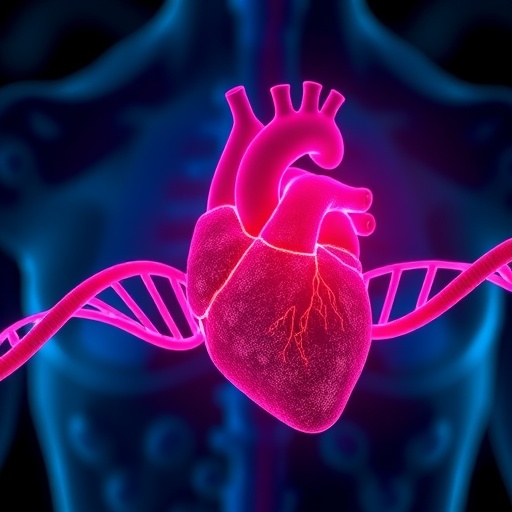A groundbreaking international collaboration led by scientists at the Victor Chang Cardiac Research Institute has unveiled new insights into the genetic and environmental factors that drive the onset of dilated cardiomyopathy (DCM), a serious heart condition linked to heart failure and sudden cardiac arrest. This expansive study, involving approximately 3,000 individuals from over 1,000 families worldwide, offers an unprecedented depth of understanding about how mutations in a gene called TTN drastically increase the risk of DCM, while also highlighting the critical interplay of lifestyle and clinical risk factors in disease progression.
Dilated cardiomyopathy is characterized by the pathological enlargement and weakening of the left ventricle, the heart’s primary pumping chamber. This structural remodeling undermines the heart’s ability to effectively circulate blood, setting the stage for severe complications including arrhythmias, clot formation, stroke, and ultimately heart failure. Despite its global prevalence affecting close to one in 250 individuals, the underlying mechanisms dictating the variable age of onset and disease severity have remained elusive — until now.
Central to this investigation was the TTN gene, which encodes titin, an essential protein providing structural support and elasticity to the heart muscle. Truncating mutations in TTN represent the most common genetic variant linked to familial forms of DCM, but prior to this study, exact quantifications of associated risk and the influence of additional modifiers were unknown. The data reveal that carriers of TTN truncating mutations are 21 times more likely to develop symptomatic DCM compared to non-carriers within affected families, underscoring the gene’s profound pathogenic role.
.adsslot_kmyKvOsLnw{ width:728px !important; height:90px !important; }
@media (max-width:1199px) { .adsslot_kmyKvOsLnw{ width:468px !important; height:60px !important; } }
@media (max-width:767px) { .adsslot_kmyKvOsLnw{ width:320px !important; height:50px !important; } }
ADVERTISEMENT
What sets this research apart is its multifaceted analysis of factors beyond genetics that modulate disease onset. The team, comprising experts from Australia, North America, Europe, the UK, and South Korea, analyzed how lifestyle elements such as obesity and alcohol consumption interact with genetic predisposition. Their findings establish these factors as significant accelerators of earlier disease manifestation, strongly advocating for preventive lifestyle modifications in genetically at-risk populations.
Moreover, clinical conditions like high blood pressure and type 2 diabetes emerged as potent contributors to the susceptibility landscape for DCM, amplifying risk in TTN mutation carriers. Notably, a history of atrial fibrillation doubled the likelihood of developing the disease, suggesting that arrhythmogenic triggers may play a central role in disease pathogenesis and progression.
Intriguingly, the study also highlights a pronounced sex difference in disease expression. Men harboring TTN mutations tend to present with DCM at significantly younger ages than female carriers, pointing to potential hormonal or other sex-specific modifiers that merit further exploration. This finding stimulates new avenues for personalized screening and risk stratification strategies in clinical practice.
The implications of these findings are profound for both genetic counseling and clinical management. Professor Diane Fatkin, head of the Inherited Heart Diseases Laboratory at the Victor Chang Cardiac Research Institute, emphasizes how identifying individuals with TTN mutations enables earlier surveillance and intervention. “Our study reveals just how much mutations in this gene raise the risk of developing DCM. That’s empowering information for patients and physicians alike,” she states.
Beyond genetic risk, Professor Fatkin stresses the critical role of modifiable health factors. “Maintaining a healthy lifestyle and appropriate medical management can potentially prevent or delay disease onset by decades,” she explains. This underscores a paradigm shift from deterministic views of genetic disorders to a more holistic understanding that integrates environment, lifestyle, and clinical co-morbidities.
At present, testing for TTN truncating mutations is straightforward and accessible through simple blood tests, yet the overarching challenge remains unanswered: should individuals with these mutations receive preventative pharmacologic therapies before symptoms emerge? Current treatment guidelines primarily focus on symptomatic individuals, but this study opens up the possibility of early intervention trials aimed at halting or delaying the progression of DCM in asymptomatic mutation carriers.
The study’s vast scope—encompassing 3,158 patients from 1,043 families—provides a robust framework for ongoing and future research endeavors. By correlating mutation type with age of diagnosis and integrating comprehensive clinical and lifestyle data, the researchers have produced a detailed risk profile that could revolutionize how genetic heart diseases are understood and managed worldwide.
Dilated cardiomyopathy continues to pose a significant public health burden due to its high prevalence and association with life-threatening complications such as heart failure, arrhythmias, and sudden cardiac arrest. As the condition advances, it often leads to multi-chamber cardiac involvement and systemic effects including compromised kidney function. With such complexity, unraveling the multifactorial causes of DCM is vital for improving prognostic accuracy and therapeutic outcomes.
This landmark study propels us closer to an era of precision cardiology where genetic information is seamlessly integrated with clinical risk assessments and lifestyle counseling. It reaffirms the critical need for multidisciplinary approaches that encompass genomics, cardiology, and preventive medicine to combat one of the world’s most pervasive cardiovascular disorders.
While critical questions remain—for example, optimal initiation timing and choice of preventive therapies—this research provides a valuable blueprint for addressing these challenges. Continued exploration into sex-specific differences, molecular mechanisms, and external risk modifiers promises to unlock novel targets for intervention and ultimately reduce the global burden of dilated cardiomyopathy.
Professor Fatkin and her team are optimistic that their findings will catalyze more focused clinical trials dedicated to evaluating early treatment strategies in genetically susceptible individuals, reshaping the clinical management landscape of inherited heart disease and transforming lives for millions at risk.
Subject of Research: People
Article Title: Titin-related familial dilated cardiomyopathy: factors associated with disease onset
News Publication Date: 11-Aug-2025
Web References: http://dx.doi.org/10.1093/eurheartj/ehaf380
References: European Heart Journal, DOI: 10.1093/eurheartj/ehaf380
Image Credits: Victor Chang Cardiac Research Institute
Keywords: Cardiomyopathy, Genetics, Mutation, Heart disease, Heart failure, Cardiac arrest, Cardiovascular disease, Obesity
Tags: cardiomyopathy and heart failurecardiovascular disease prevention strategiesdilated cardiomyopathy researchenvironmental influences on DCMfamilial dilated cardiomyopathygenetic factors of heart diseaseheart structural remodelinginternational heart disease studylifestyle impacts on heart healthrisk factors for sudden cardiac arrestTTN gene and heart functionunderstanding heart muscle mutations





